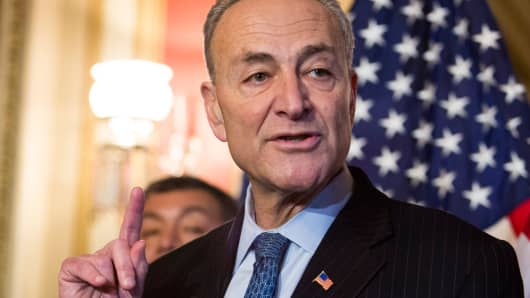Anti-trade critics are arming themselves with a grab-bag of attacks on proposed U.S. trade agreements and the legislation to bring those deals to Congress for a vote.
Some critics focus on the negotiating process ("secret!") or accuse the U.S. of using the negotiations as a backdoor way to subvert or expand domestic regulations or standards. Both assertions are overblown, but they pale in comparison to charges by the currency protectionists.
This week a strange-bedfellows group of Senators rolled out an anti-currency manipulation bill that will serve no other purpose but to upend trade expansion talks currently underway, in particular the Trans-Pacific Partnership.
Read MoreUS lawmakers seek to tackle currency cheating with trade bill
I don't know what else Sens. Sherrod Brown, Jeff Sessions, Lindsey Graham, Chuck Schumer, and Debbie Stabenow agree on, but I find it a little hilarious that the one thing they do seem to agree on is the ability of the federal government to precisely determine the "misalignment" of the U.S. dollar relative to the currencies of our trading partners.
And then, after precisely determining the degree of misalignment, government analysts would be expected to re-price imports from foreign countries to account for their estimate. Now, the federal government actually does some things well, but price setting isn't one of them. I wouldn't trust the federal government to set prices for milk or potato chips, let alone the thousands of products we import from our trading partners. I'm surprised some of these senators don't share those concerns.
Determining the appropriate relative value of a currency at any point in time sounds fun and easy, but it's neither of those things — especially in a world of global supply chains, and where central banks are dealing with domestic deflation, imperfect currency unions, and volatile commodity prices, assessing currency values is largely in the eye of the beholder.
Read MoreAfter G-20, Lew says race to devalue a big mistake
The senators also don't seem to understand that currency manipulation charges can go both directions, and that their protectionist import pricing remedy can be used in reverse to deal with the U.S. dollar. When the dollar is undervalued relative to one of our trading partners' currencies, should we offer a discount on U.S. exports?
Or do the senators believe it's only ever possible for the U.S. dollar to be overvalued, but never undervalued?
You see the problem here?
For much of the past decade many in Europe felt that the euro was too strong relative to the dollar, and that the U.S. was enjoying an unfair trading advantage. More recently, as the Federal Reserve used quantitative easing to prevent deflation in the U.S., emerging market countries accused the U.S. of trying to engineer a weaker dollar to improve our terms of trade. And this wasn't mere whining by foreigners — Fed critics in the U.S. Congress leveled exactly the same charge!
Read MoreThis will be the key to oil's bottom: Analyst
Seriously…imagine France or Brazil re-pricing U.S. products because of their perception that the dollar was in misalignment whenever the Fed lowers its policy rate.
These anti-currency manipulation efforts are themselves misaligned and myopic. If another country tried to impose such a scheme on the United States, these very same critics would be howling in protest. It's protectionism in disguise, intended only to defeat trade expansion, and it should be opposed.
Commentary by Tony Fratto, managing partner at Hamilton Place Strategies, a strategic communications and crisis management consultancy based in Washington, DC. Prior to that, he was deputy assistant to the president and deputy press secretary to President George W. Bush from September 2006 to January 2009. Follow him on Twitter @TonyFratto.


